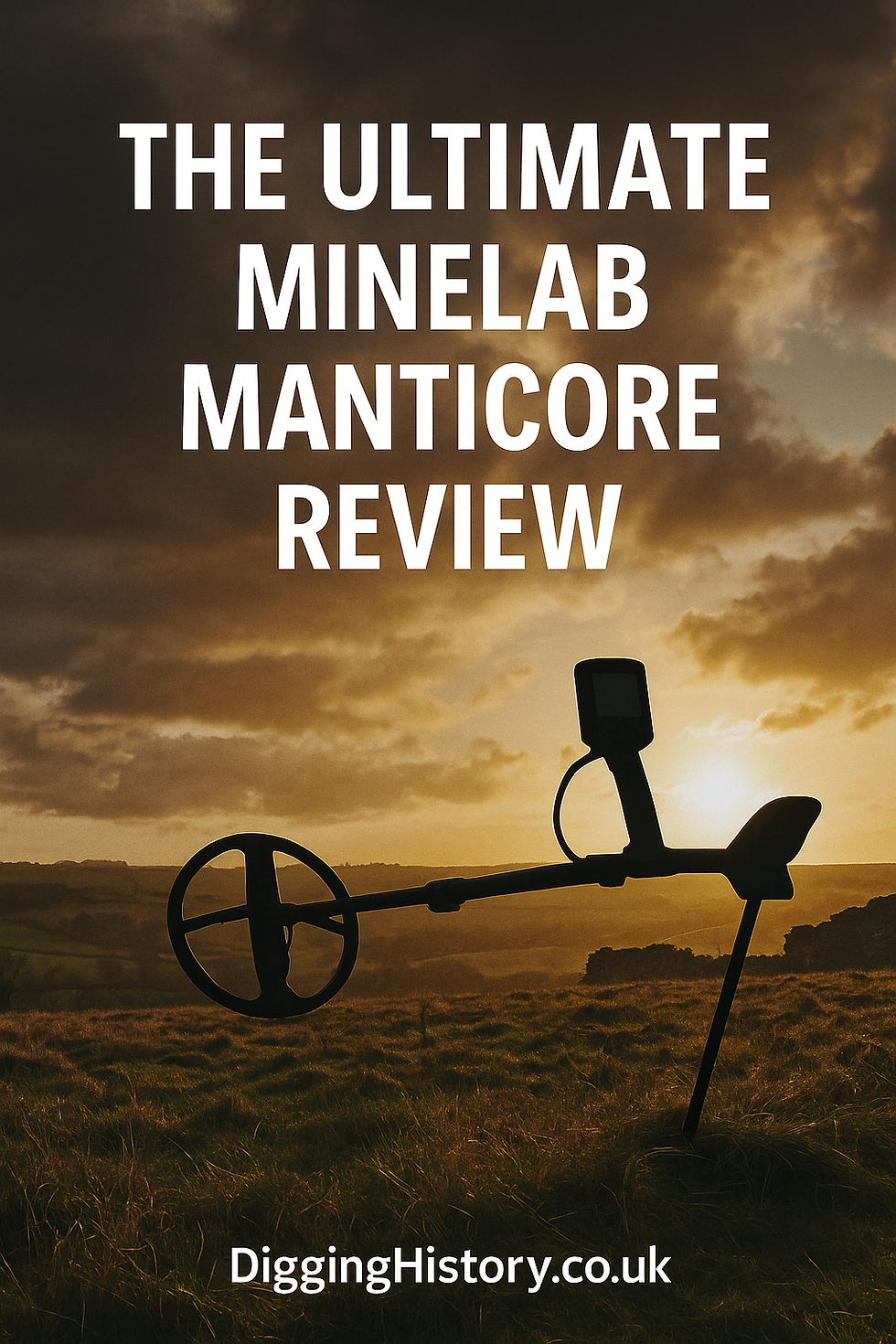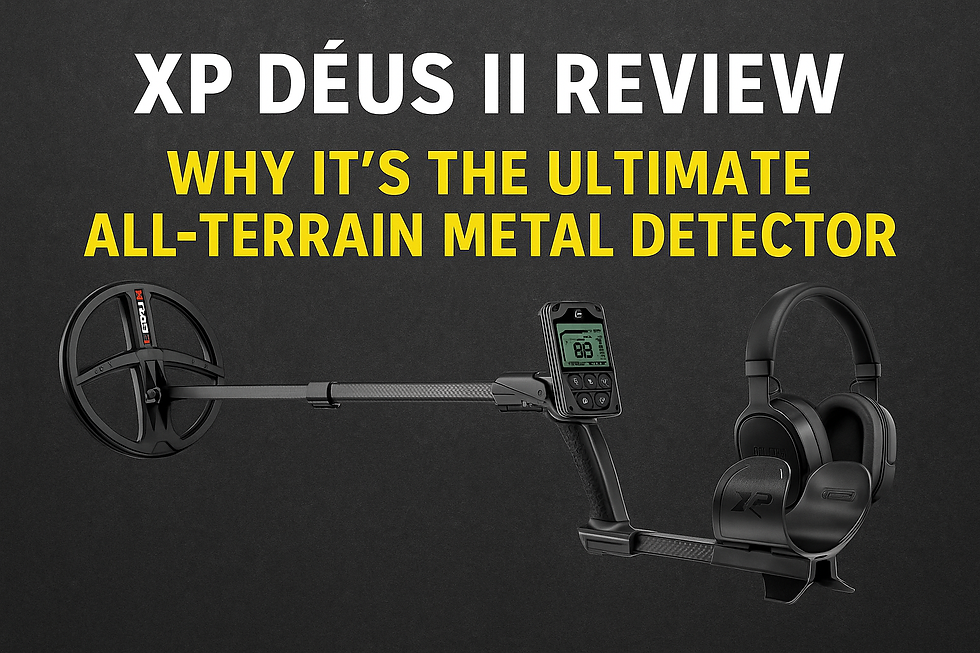Metal Detecting in the UK: The Ultimate Guide to History, Treasure and Getting Started
- DiggingHistory.co.uk
- Sep 10
- 6 min read
Updated: Sep 12
Metal detecting in the UK is more than just a hobby. It’s a fascinating mix of exploration, discovery, and connection with the past. Few other countries in the world have such a rich archaeological landscape, and Britain’s fields, beaches and woodlands have yielded everything from Roman coins and medieval brooches to Anglo-Saxon gold and even Bronze Age treasures.

For thousands of people across the country, metal detecting is an adventure into history. Every beep and signal brings the chance to uncover something that has lain hidden for centuries — perhaps even millennia. But it is also a responsible pastime: laws, codes of practice, and historical recording schemes ensure that finds are preserved and studied for the benefit of everyone.
Whether you are curious about getting started, interested in famous finds, or simply want to know more about this extraordinary world, this guide will take you deep into the world of metal detecting in the UK.
A Hobby with Deep Historical Roots
The idea of searching for buried treasure isn’t new. In fact, people have been fascinated with what lies beneath the soil for centuries. However, modern metal detecting began in earnest in the 1970s, when affordable detectors became available to hobbyists.
Britain is one of the most rewarding places on earth to detect. The island has been home to Celts, Romans, Anglo-Saxons, Vikings, Normans, medieval traders and more. Each civilisation left behind coins, jewellery, weapons, and everyday objects. Many of these items were lost, buried, or hidden as hoards — and are only now being rediscovered.
This unique history makes the UK an international hotspot for detectorists. From East Anglia’s fertile farmland to the beaches of Cornwall, every region has its own hidden story waiting to be uncovered.
Why People Love Metal Detecting
Ask any detectorist why they spend hours in fields and on beaches, and you’ll hear similar answers:
The thrill of discovery – Every signal could be something remarkable.
Connection with the past – Holding a medieval coin or Roman brooch is a tangible link to history.
Peace of mind – Detecting is often described as meditative, combining outdoor exercise with focus and patience.
Community – Clubs and rallies bring people together to share stories and discoveries.
Detectorists often say that the hobby is part adventure, part archaeology, and part relaxation. Even when most finds are modern scrap, there is always the chance of uncovering something that rewrites history.
The Treasure Act and the Law in the UK
Metal detecting in the UK is tightly linked to heritage law. Unlike in many other countries, hobbyists here have a legal framework that allows finds to be reported, studied, and, in some cases, acquired by museums.
The Treasure Act 1996
This law defines what counts as “treasure”. Generally, it includes:
Objects over 300 years old that are made of gold or silver.
Groups of coins from the same find if they are at least 10% precious metal and at least 300 years old.
Hoards of two or more prehistoric objects, regardless of metal.
Any items associated with treasure finds (for example, containers).
All potential treasure finds must be reported to the local coroner within 14 days. Failure to do so is a criminal offence.
The Portable Antiquities Scheme (PAS)
Not every find qualifies as treasure. However, the Portable Antiquities Scheme, run by the British Museum and local Finds Liaison Officers, records millions of artefacts found by the public. This database has transformed our understanding of British history.
Everyday items such as buckles, buttons, and medieval trade tokens might not be treasure, but they still provide valuable insights. Detectorists are encouraged to record these finds with the PAS.
Permission and Responsible Detecting
It is illegal to detect without permission. Detectorists must:
Obtain landowner consent for private land.
Avoid protected sites such as Scheduled Monuments and Sites of Special Scientific Interest.
Follow the Code of Practice for Responsible Metal Detecting in England and Wales.
These rules ensure the hobby supports archaeology rather than damaging it.
Famous Treasure Finds in the UK
Some of Britain’s most extraordinary treasures have been unearthed by detectorists. These discoveries prove that history is all around us.
The Staffordshire Hoard (2009)
Discovered in a farmer’s field in Staffordshire, this hoard contained over 3,500 items of Anglo-Saxon gold and garnet weapon fittings. It is the largest collection of Anglo-Saxon gold ever found and shed new light on early medieval warfare and craftsmanship.
The Hoxne Hoard (1992)
In Suffolk, a detectorist stumbled upon a buried Roman chest containing 14,865 coins and hundreds of silver and gold objects. It remains the largest hoard of late Roman gold and silver ever found in Britain.
The Ringlemere Cup (2001)
Found in Kent, this fragile Bronze Age gold cup is one of only a handful ever discovered in Europe. It dates back to around 1700 BC and now resides in the British Museum.
Other Remarkable Finds
The Frome Hoard (2010) – Over 52,000 Roman coins discovered in Somerset.
The Lenborough Hoard (2014) – A collection of more than 5,000 Anglo-Saxon silver pennies.
Countless medieval pilgrim badges, Bronze Age axes, and Viking artefacts across the country.
These finds are reminders that Britain’s soil holds countless stories waiting to be revealed.
Getting Started with Metal Detecting in the UK
If you are new to the hobby, here’s how to begin responsibly and effectively.
Choosing a Metal Detector
Detectors range from budget-friendly to professional-level machines. Key considerations include:
Beginner models – Affordable, lightweight, easy to use (ideal for learning).
Intermediate detectors – Greater depth, discrimination, and settings.
Advanced detectors – Specialist features for relic hunting, coin shooting, or beach detecting.
Popular brands in the UK include Garrett, Minelab, Nokta, XP, and Quest.
Essential Accessories
A sturdy digging tool or trowel.
A finds pouch or bag.
Headphones (to hear faint signals).
Pinpointer probe for locating targets in the soil.
Protective gear such as gloves and boots.
Where to Detect
Private farmland – With landowner permission, this is often the most rewarding.
Beaches – Coastal detecting is legal in most areas, though local by-laws may apply.
Woodlands and common land – Always confirm permission before detecting.
Avoid protected archaeological sites, as detecting there is strictly illegal.
Tips for Success as a Detectorist
Be patient – Most signals are rubbish (nails, cans, foil). Persistence pays off.
Learn your machine – Spend time experimenting with settings and tones.
Dig carefully – Use clean cuts when digging plugs, and always replace turf neatly.
Record your finds – Both for your own catalogue and the PAS.
Join a club – Local detecting groups often have access to farmland and organise rallies.
Stay respectful – Leave no mess, follow the law, and respect landowners’ wishes.
The Metal Detecting Community
One of the most rewarding parts of the hobby is the community. Across the UK, there are hundreds of metal detecting clubs. These groups:
Provide training and advice for beginners.
Organise rallies, where dozens of detectorists explore a site together.
Foster friendships and knowledge-sharing.
Online forums, Facebook groups, and YouTube channels also form a vibrant part of the community. Stories of amazing finds, equipment reviews, and live digs inspire thousands of hobbyists.
The Future of Metal Detecting in the UK
As technology advances, metal detectors are becoming lighter, more accurate, and capable of deeper detection. The rise of digital mapping, GPS, and online find databases means the future of the hobby is more connected than ever.
At the same time, archaeologists increasingly recognise the value of detectorists’ contributions. The partnership between hobbyists, museums, and academics continues to grow. Together, they are building a more complete picture of Britain’s past.
Conclusion
Metal detecting in the UK is a hobby like no other. It blends adventure, patience, history, and responsibility into one fascinating pastime. From humble buttons to spectacular gold hoards, each find adds another piece to the puzzle of Britain’s story.
For beginners, it offers a chance to step outside, slow down, and experience history in a unique, hands-on way. For experienced detectorists, it is a lifelong pursuit, where the next signal might change history.
So, whether you are drawn to the thrill of treasure hunting, the serenity of walking fields and beaches, or the excitement of contributing to archaeology, metal detecting in the UK offers it all. Beneath our feet lies a hidden world — waiting for you to discover it.





Comments